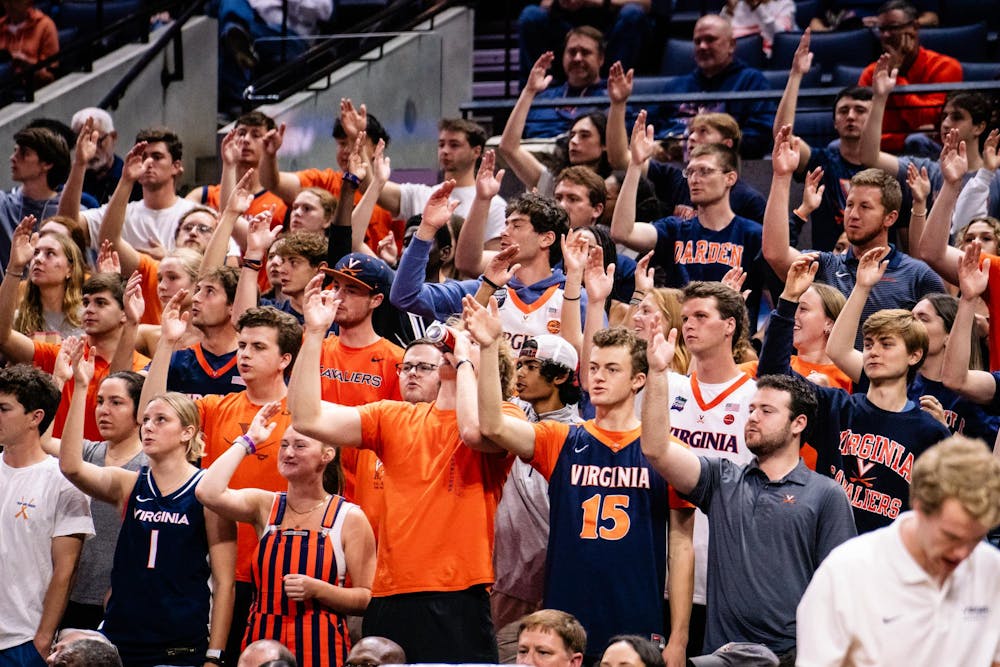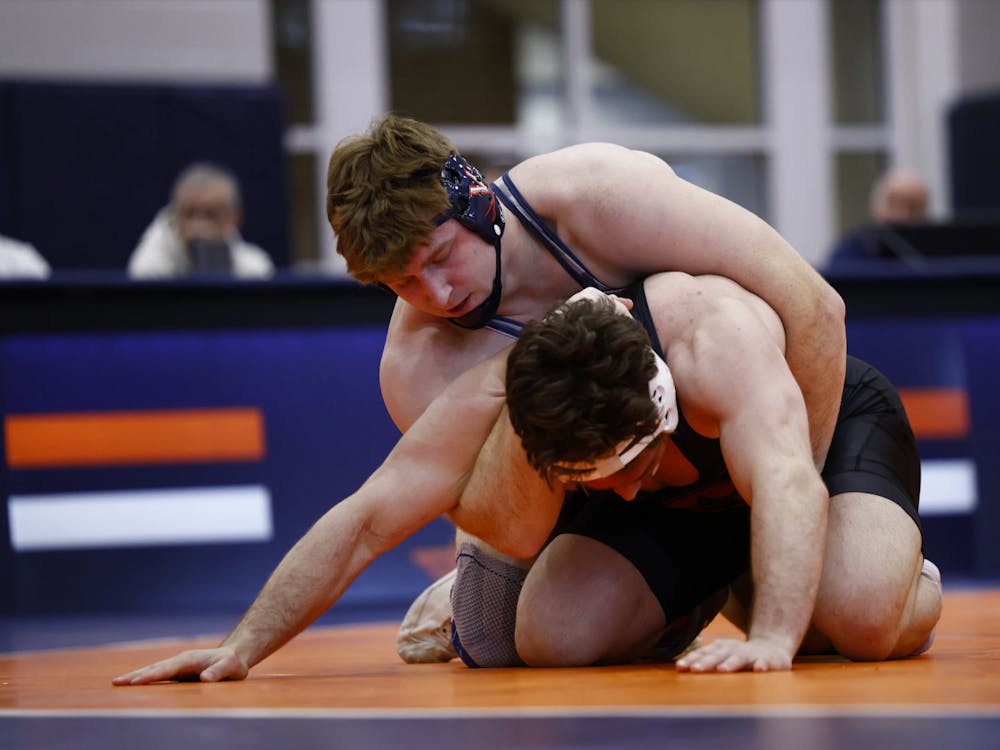At Virginia, game days are more than just a tradition — they are a defining part of student life. Whether it is singing The Good Ol’ Song after a touchdown at Scott Stadium, cheering in unison at John Paul Jones Arena or watching a top-ranked team compete under the lights at Klöckner Stadium, sports games bring the community together.
Every new student has had to decipher how to get into games, which teams to watch and how to get a ticket when the biggest matchups of the year roll around — and some never fully figure it out. Sabre Points are that missing puzzle piece — but what exactly are they?
The Sabre Points system tracks attendance and rewards students for engaging with all of Cavalier sports when distributing tickets for the highly coveted men's basketball games. The more a student shows up to games throughout the year, the better their chances of getting into men's basketball games and of getting better seats.
All regular-season home sporting events are free with a student ID. Students scan in at the gate, attend and earn a Sabre point. Every sport is weighted equally — one point — except for football, which is worth five. Entering the stadium 30 minutes before kickoff comes with an additional five.
Those are not the only opportunities for an instant points boost. A select number of games — from a fall soccer game to a spring tennis match — are designated as “Sabre rewards events,” worth five points instead of one. These are usually important games listed on the Virginia Athletics website. They are often scheduled when a highly ranked opponent comes to town, third-year Batten student Evan Davisson points out, ensuring it will be an exciting watch.
Davisson saves the Sabre rewards schedule on his phone at the start of every school year, giving him the chance to thoroughly explore varsity athletics — an effective tactic, as he finished his second year with more than 100 Sabre Points.
“I try to go to as many five-point games as possible while still going to the games that I personally enjoy,” Davisson said. “I played soccer in high school, and I swam, so those are the events I'll go to even if they're not big five-point events.”
That is how to get the points — and 20 percent of every student’s existing points roll over into next year, meaning if Davisson had exactly 100 points, he would start this school year with 20.
But why are they important? Men's basketball is where the points matter, as it is the only sport where students are not guaranteed to get a ticket due to the team’s popularity and the arena’s limited capacity. Students request tickets online in advance, and, if demand exceeds supply, tickets are distributed through a lottery. Here is where students’ accumulated points come in. The more points you have, the more entries you have in the lottery — one per point — and the more likely you are to receive a ticket.
To apply for men's basketball tickets, students need to keep an eye on their emails. Virginia Athletics will begin to send out a request link for the upcoming games in early November — sometimes one week in advance, other times earlier if tickets for multiple games are released at once. All this requesting happens through the SHOTS system, the online headquarters for everything related to the system.
Ticket decisions also come via email, after which those students who were selected can add tickets into their digital wallets to be presented at the door, along with their student ID.
Even after landing a ticket, Sabre Points still matter. Student entry into John Paul Jones Arena is divided into eight groups, from Group 1 to Group 8, based on point totals. Group 1, with the highest point totals, can enter 60 minutes before a game, Group 2 can enter at 55 minutes and so on.
That gives those students a chance — usually in a speed-walking scramble — to get the best seats, where the most enthusiastic fans tend to gather. Davisson, typically in Group 1, knows which seats he is gunning for.
“I'll choose one of two places,” Davisson said. “Either right behind the [away] bench, closer to the big student section with the band, so that you can see more of the action and yell encouragingly … or right in the student section with the band, but over closer to the tunnel where the players exit and enter the court.”
Late groups enter in staggered waves, with Group 8 being the last. While any ticketed student is guaranteed a seat in one of the three student sections — along the sideline, behind the basket, tucked away in the upper level — getting in early ensures a better view and atmosphere. Third-year College student Catherine Goldstein remembers how Sabre Points quickly became part of her college routine during her first semester.
“First-year, I cared about [Sabre Points] because I didn't really know how competitive basketball tickets were,” Goldstein said. “I was very adamant on going to all the football games, even though I do anyway, but I was making sure I got my Sabre Points so that I could get basketball tickets.”
Like many students, Goldstein assumed that attending men's basketball games would earn her points, which is false — attending a men's basketball game does not add to your tally. Since points determine access to those games, attending them offers no additional benefit, although missing a game once you have received a ticket will actually deduct one point from your total if you do not cancel your ticket by 12 p.m. the day prior and two points if you do not attend the game and neglect to cancel.
While this all may seem daunting, Goldstein emphasized that for the average student, ticket access is usually easier than expected.
“I thought the tickets were harder to get than they actually are,” Goldstein said. “This year, if you say you want a ticket you basically will get one.”
This may be due to apathy from a historically bad season. But even in a good year, it is generally true that tickets, especially for non-rivalry games, are fairly accessible. Students that forget to request tickets may even be able to pick up unclaimed or returned student tickets on the SHOTS website. However, the occasional marquee matchup — like against Duke or Virginia Tech — may reach capacity and leave some students without tickets.
The desire to attend games like those incentivises students to attend varsity games in general, occasionally convincing them to watch a sport they normally would not, which is exactly how Davisson discovered the often-overlooked field hockey team.
“I had never been to a field hockey game … but it was a five-point event,” Davisson said. “I decided, ‘Ok, I'm just going to go.’ I ended up really enjoying it, and it made me more likely to go to one in the future.”
There is a lot to cheer for across the sports. Virginia's athletic programs are among the best in the country, with 35 national championships and counting. Both men's and women's lacrosse are perennial ACC contenders, and the women's soccer and field hockey teams often make deep postseason runs. Even sports that fly under the radar — like rowing, wrestling and squash — regularly punch above their weight on the national stage.
Not only are Sabre Points key for getting into men’s basketball games — for the front-row devotees bent on running up their total or the casual fans just wanting a seat — they also help invite students into the wider sports community, where Virginia students have an amazing opportunity to cheer for their peers, and their school, at countless levels.
“When we're doing well in a sport, people kind of go all into it because people love the school and we have a lot of school spirit,” Goldstein said. “So that's always fun.”







